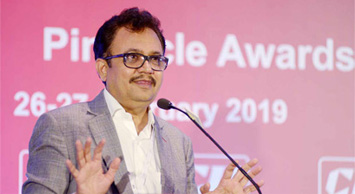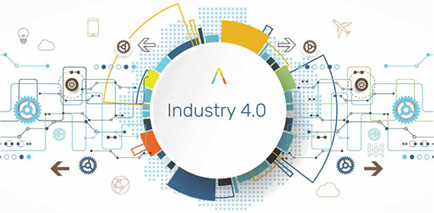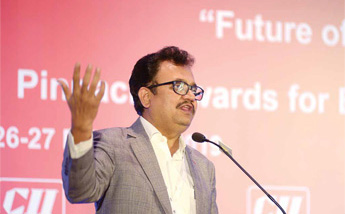India is on its way to become a one trillion dollar manufacturing economy. With such vast ambition and advantages in the next phase of globalisation. At a CII conference on ‘The Future of Manufacturing’ Managing Director of Jyoti CLC Automation Limited elaborated on how India’s demographic dividend manufacturing heavyweights, but win that fight too. Corporate Citizen brings you the riveting session. come numerous obstacles. What exactly, then are the challenges held recently in Mumbai, Parakram Singh Jadeja, Chairman and and ability to adapt can help us not just compete with global
The next growth of this world is going to come from India; we are going to be a driver for this growth; because all of us know that we are 1.3 billion people, we are a young country, and there is a great opportunity

The question on everyone's mind is Globalisation and India’s challenges and advantages with respect to it. Who will deny that we are into a globalised world? It is because we are living a life full of technology and the way the ideas and the products are moving around us, and we all are seeing that and the globalised world is here now; but what is the advantages for globalisation and particularly this 4.0 and particularly for India?. The next growth of this world is going to come from India; we are going to be a driver for this growth; because all of us know that we are 1.3 billion people, young country, and there is a great opportunity, Today India is growing at an average of seven per cent of GDP and we are the fastest growing economy in the world, and hopefully we will grow from 7 to 10 per cent in between in the next 10 to 20 years, because all natural phenomena has been set towards redirections and that is the biggest advantage for all of the Indian manufacturing industry and all the people over here.
I feel they are all in a comfort zone, and this is not going to be a comfort zone for all of us in the coming days, because these companies, are going to come over here, and they have already come over here, they have a great advantage that they have low cost of the capital, they have a huge peak size and we always talk that they will never be able to beat us because we have a low-cost manpower, but here these all people are going to be our own people, they will come over here and they will utilize our own people and my feeling is that they will grip our business and that is a challenge for all of us. So we will have a pressure in the coming days in terms of margin we will feel the pressure in terms of our market share and a lot of other things, even technology and these are all going to be a challenging time. I said that it will be an advantage, why people will come over here? Everyone is going to look at India as a market, and all these people are going to come to India, and they have a great advantage that they have low cost of the capital. So we will face pressure in the coming days in terms of margin. We will feel the pressure in terms of our market share and a lot of other things, even technology and this all going to be a challenging time. I see this as the greatest challenge because we are small companies, our history is very small and they are large players, so how to come back to them, how do we address them?
I am a chess player, so in chess we say that attack is the best defence, we should not wait that they will attack us, we will safeguard ourselves and we will ask for a duty structure, subsidies and a lot of government help. My meaning of this attack is that their market is a globalised player, they are a developed nation’s people and we have to make them fight and give them more competitiveness, we have to survive over here, so my feeling is that we have to attack over there. A way to do so is to acquire them, we have to do a lot of marketing and everything to be there in their area and we have to give them a competition in their market, because in globalisation everything is open, if they are coming over here, we are also allowed to go there. U.S. is losing their all competitiveness and even all of Europe also is losing their competitiveness, because as their companies are getting larger, they are acquiring smaller companies and becoming a big giant. Look at the top 100 companies in the U.S., look into the percentage of them being in their market segment, if you look at Google, they have a 90 per cent market share. Microsoft, like any other giant has capital power, they have money, and what their nation is forgetting is that because they have skinned small players, so right now they are not facing a lot of challenges now and they are increasing their size. And we have to keep in mind too, that when they come over here, they are going to grab us first, and we do not have to sell ourselves. If we go there and if we attack them, definitely we can make some good numbers there.
At the end of the day we have learnt that a lot of transformation has happened with our people, so today we are able to enter into European markets. No one thought that any Indian company can sell a machine of Airbus and the BMW in our cities. To be a product from India, and sell in India, is not easy

I would like to share some experience with my company. We are into machine tools. We are manufacturing CNC machines. I started my career as a small job shop in Rajkot in 1981, From 1998 to 2007 we were trying to develop our product and we realized that we needed to be more of technology, and we do not have technology in any segment, so we were a very small company at that time and we took a decision. How did we acquire technology? We learnt it is either in Japan, or with the Europeans, and nobody had any thoughts that we could acquire a company. So we then took a decision, it was a very big decision. The company what we chose was three times bigger than what we are at that time, and we successfully acquired them in 2007 and because of their technology and other intangibles, Jyoti today is seven times bigger than what we were at 2007. What we learnt from this acquisition is technology, and technology is not in the drawings or in the model, technology is with the people. A good exchange programme is happening for the last 10 years and our people understood that very well. We learnt what is a machine tool and what is precision. The mindset and the quality, the ‘chalta hai’ approach, what we are having here every day, that has changed here and we have learned a lot.
So, at the end of the day we have learnt that a lot of transformation has happened with our people, so today we are able to enter into European markets. No one thought that any Indian company can sell a machine of Airbus and BMW in our cities. To be a product from India, and sell in India, and to make it in India is not easy, because we are not a brand, we are not a branded player. The way we acquired them so nicely and managed them is why we are able to enter into European markets, and we have learnt another thing, which is confidence. This confidence is very necessary today for all of us in India. Our current mindset until now, when we talk of technology and machines we think it is only with the western people and the Japanese. Now when we work with them we are able to realize that we are also able to do these things. Now after 10 years we took a decision recently, that the machine will be made in India and we will put a label “ MADE IN INDIA” and we will export to them. So this is how I am sharing my story, and this is my experience that we have to leave the comfort zone; before they enter the Indian markets, we have to go there and make more and more investments into Research and Development (R&D) and not to put our money into all industrial people, once they have reserve funds, they are backing for mutual funds and F.D and the future.
I say that the future is in Research and Development, and we shall put this money into Research and Development. Then and there we can combat this globalisation and in the coming days we all know that a new buzzword is coming into a play called industrialization 4.0, AI (Artificial Intelligence) and other things on the internet, and I am strongly a believer of that. Everyone must have listened to our prime minister’s speech two days back, wherein he mentioned GPS, and in the first three industrial revolution, India was nowhere there, but in the fourth industrial revolutions we will not miss the bus. I am a strong believer in that.
To compete with the western world and globalisation we have to introduce automation. The westerners are doing automation in a different way, because they do not have people. Our greatest advantage is that we have people

The most advantageous situation the nation has is that we are in India during industrialization 4.0. Someone may ask, Why? It is because of our culture and our education system. We always felt that all these education systems is with the U.S. and the western world, and not with us, but I am not talking of that infrastructural education system, I am talking of cultural education system in our home that our grandparents have imbibed into us. The world is moving towards more and more digitalization I have noticed. So what the important parameters in digitalization? It is mathematics as everything will be based on mathematical equations. And I strongly feel that the mathematics of an average Indian is excellent, and it is not because of our infrastructure, but I feel because of our poverty. If you have no base of mathematics then you have nothing to do big in this world. This mathematics is going to make us a leader in this next century soon. This is the biggest driving force for us because the average Indian’s mathematics is excellent. Look at a farmer or any poor uneducated person who has never been to a school, even his maths is excellent. Now I can speak with confidence that my company is in France, Germany and Canada; and I have noticed there is a big gap in the mathematics of an average westerner and an average Indian, hence we are going to be a leader in this journey of Industrialisation 4.0 or digitalization. . Whenever there is a positive vibe going on, there are a lot of negative vibe people who reach there to stop all the work.
The greatest advantage for India in digitalization is our culture, I am speaking from our past history and history of all cultures. Up to 1850 A.D. we were the largest economy in the world, when we say it to the next generation they do not believe us because our name is not registered in that manner in the history books, and I believe that only their names are registered in history books who are destructive in nature. No history is made of creative people and their creativity as a sad fact. We have no idea of our DNA, our DNA is our creativity. Our feeling is that we need to introduce automation where there is a need for a repetitive job.
Human beings are not made for repetitive jobs. Humans are born for creativity and celebration and we need to look into it. We have forgotten that, and the great advantage of digitalization is that it will allow us to go back to our normal behavior. To compete with the western world and globalisation we have to introduce automation and we have to free these people to think and innovate. They need to grab new technologies and we can create a lot of new things without destruction. We have done that in past and we can create it again in the future too. The westerners are doing automation for in a different way, because they do not have people. Our greatest advantage is that we have people.
We feel that we need to introduce automation where there is a need for repetitive jobs. But the truth is that human beings are not made for repetitive jobs. Humans are born for creativity and celebration and we need to look into it. Over time we have forgotten that, and the great advantage of digitalization is that it will allow us to go back to our normal behavior
I come from Rajkot, and there is a company called Balaji. Eight years ago, Pepsi had a brand called Leher, this guy kept his price at Rs.5 and covered all the highways first, and the small shops and the pubs, Leher was mostly found at costly places and 5-star hotels. Whenever you give competition, a crocodile comes to harm you. So Pepsi came to Rajkot and offered them a very handsome valuation. The company in 2010 was doing around 200-250 crore turnover and they offered them a price of 3000 crore, and usually Indians take up the offer whenever such a remuneration of high valuation is offered to them. The owner came to me and asked for advice, and I am happy that he did because we supply tools and machines to them. He said “Parakram, I do not understand. These people have come to buy us”. I shared my apprehension, and he agreed and said that we do not wish to sell. Today that company is selling in six states. Today, that Rs.40 Lay’s is also today at Rs.5.
After five years this man went up to Pepsi and offered them money instead. He said “Do you have any plant to sell and exit let me know. I have some money that I wish to invest. This is a small example. If only we are able to go ahead like that, we are able to overcome this challenge. Otherwise, the way this flood is coming over here they will wash us. In fact, we want globalisation, this is the greatest advantage for the country, because we have nothing to lose at all, they have to open their doors for us and we have to enter it. I wish that a lot of youngsters are here who can understand these things and convert this challenge into opportunity and that will be a winning moment for the nation tomorrow.
We have recently launched a product called industry 4.0, it is not a product but a thought, the name has been given by Lady Merkel in Hannover. Our prime minister was there, and I was lucky to be there with him, and we were shocked because we were developing a similar product too at that time. We had an exhibition earlier and we had put up this product and we had no idea that this product comes under the classification of Industrialization 4.0. We have named this product Seventh Sense. People ask what does Seventh sense mean? We say, the software that we have made, or the tool that we have made, it will do all the repetitive job within the factory and within a manufacturing job including quality, maintenance and inspection. This seventh sense will free all people in a factory so that they can use their sixth sense that is naturally god gifted to us.
I think I have covered whatever I wanted to tell you, Yes there is a transformation I have felt in my company, we are talking deeper and in a different language. If we were in a comfort zone we would have never been able to do this things. So venture out, buy them out, invest there, make aggressive marketing into their area and make more advanced manufacturing practices. I saw that today’s function is an excellence in manufacturing or future manufacturing. We together went to U.K. fair where they displayed what is the manufacturing at 2050, what is the future factory set up. My opinion is that a future factory will need preparedness that batch production for any company will not be more than one piece. We have to be prepared to make every job a new job and everything a new thing. The western world does not have a population to do that, and that is the greatest advantage for us and we have to leverage this advantage and win.
By Neeraj Varty and Namrata Gulati Sapra